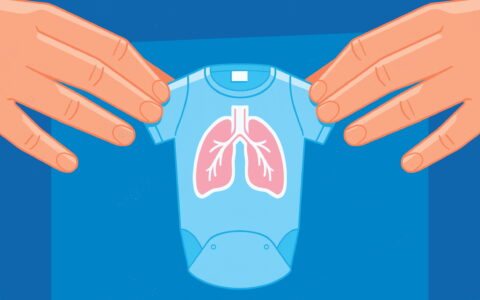New findings from the INSPIRE trial – Infant Susceptibility to Pulmonary Infections and Asthma Following RSV Exposure – establish a strong link between early respiratory syncytial virus (RSV) and asthma, which affects about 8 percent of children in the United States.
The majority of children are infected by the ubiquitous virus by the time they are two years old, and the condition is typically not life-threatening. However, evidence has mounted that an infection in the first months of life — even one without symptoms — can affect a developing infant in consequential ways long-term.
“Observational studies over the years have consistently shown an association between RSV bronchiolitis and childhood asthma, but this is the first time anyone has looked at the impact of RSV exposure, which included asymptomatic, mild and severe cases,” said Tina Hartert, M.D., director of the Center for Asthma Research at Vanderbilt University Medical Center, who leads the INSPIRE work.
“Even in this broad group, we find a significant association that is both age- and severity-dependent.”
Mechanism of Action
Cell-based studies from the Vanderbilt group and others have unearthed evidence that an RSV infection triggers long-term reprogramming of the early-life immune response. RSV infection during infancy is associated with subsequent dampened type 1 (antiviral) memory T-cell responses but does not appear to affect later type 2 (pro-allergic) immune responses.
“We have found that RSV infection during the first year of life, an important period of lung and immune development, can impact the human microbiome and the immune response, and it can even have long-term effects on the development of the airway epithelial cells,” said Vanderbilt pediatric pulmonologist Christian Rosas-Salazar, M.D., who served as first author on the latest asthma study, published in The Lancet.
Robust Association
The INSPIRE researchers looked at molecular and serology data from children born in Middle Tennessee to determine if they had been infected with RSV in the first year of life. Then, they followed the children to examine the outcome: asthma diagnosis – or not – by 5 years of age.
A secondary outcome was recurrent wheezing during years 2, 3 and 4 of life, which indicates a path toward asthma. Additionally, the researchers segregated infants with atopic and nonatopic asthma to see if the virus was complicit in both.
A total of 1,741 children were included in the analysis. Fifty-four percent, 944 children, had been infected with RSV during the first year of life. Asthma diagnoses were present in 16 percent of children without previous RSV exposure, but reached 21 percent in those with a history of RSV.
After adjusting for the children’s sex, race and ethnicity, breastfeeding, day-care attendance and other factors, the results indicate that RSV exposure confers a 26-percent higher risk of developing asthma by 5 years of age.
Impact of Findings
The authors estimate that 15 percent of the asthma cases at age 5 could have been prevented by avoiding RSV infection during infancy.
“Even small reductions in the first-year incidence of RSV could have a large public health effect worldwide, affecting many millions of children. Our cohort included children with a mild or asymptomatic infection, and we still found an impact.”
“Even small reductions in the first-year incidence of RSV could have a large public health effect worldwide, affecting many millions of children,” Rosas-Salazar said.
“One of the novel aspects of our study is that our cohort included children with a mild or asymptomatic infection, and we still found an impact on childhood asthma in these children,” Hartert said. “I think if we want to get the biggest impact of RSV prevention strategies, we should also be studying mild viral infections, because that’s the majority of them.”
Clinical Interventions
Hartert is eager to examine the potential of new RSV-prevention development efforts now underway.
“I believe that we need to study the long-term impact of these RSV-prevention products once approved, as they may not only avert serious RSV infections during infancy, but could have long-term benefits on asthma prevention,” she said. “They could also possibly decrease the early-life risk of otitis media, pneumonia, and lead to lower antibiotic prescriptions.”
Vanderbilt has been at the leading edge in examining the developmental origins of asthma, as well as taking RSV drug discovery from lab to pharma, uncovering new antibody treatments and laying the groundwork for vaccines.
“Ultimately, the importance of these studies is translating these findings to intervene in early life to prevent asthma,” Hartert added.






